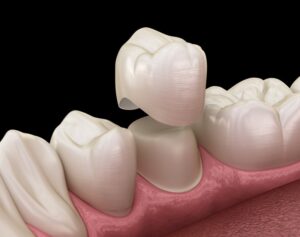Dental crowns are a common and effective solution for restoring teeth that are weakened, damaged, or cosmetically imperfect. Whether your crown is protecting a tooth after a root canal, covering a dental implant, or repairing a cracked tooth, it plays a vital role in keeping your smile strong and functional. But one of the most frequent questions patients ask is: how long does a dental crown last?
The lifespan of a crown depends on several factors, but with proper care, most last many years—sometimes even decades.
Average Lifespan of Dental Crowns
On average, dental crowns last 10 to 15 years. However, with excellent oral hygiene and healthy habits, crowns can often last 20 years or longer. Some patients may even keep the same crown for a lifetime. Ultimately, the longevity of your crown depends on the type of material used and how well you care for it.
Types of Crown Materials and Their Durability
- Porcelain Crowns: Known for their natural, tooth-like appearance, porcelain crowns typically last around 10 to 15 years. They are popular for front teeth but may wear down faster under heavy biting forces.
- Porcelain-Fused-to-Metal (PFM) Crowns: These crowns have a strong metal base with a tooth-colored porcelain coating. They usually last 10 to 20 years but may show a dark line at the gumline over time.
- Gold or Metal Crowns: Made from gold or other alloys, these crowns are extremely durable and resistant to wear, often lasting 20 years or more. They’re less common for front teeth due to aesthetics but are ideal for molars.
- Zirconia Crowns: A newer option, zirconia crowns combine strength with a natural look. They are highly durable and can last 15 to 20 years or longer.
Factors That Affect Crown Longevity
- Oral Hygiene: Brushing twice a day, flossing daily, and attending regular checkups help prevent decay around the crowned tooth.
- Biting and Chewing Habits: Grinding, clenching, or chewing hard foods (like ice, nuts, or hard candies) can chip or crack crowns.
- Gum Health: Crowns depend on healthy gums and bone support. Gum disease can cause crowns to loosen or fail.
- Lifestyle Habits: Smoking, poor diet, and neglecting dental care can shorten the lifespan of crowns.
- Accidents: Trauma from sports or falls can damage both natural teeth and crowns.
Signs a Crown May Need Replacement
- Pain or sensitivity around the tooth.
- Visible cracks, chips, or wear on the crown.
- Gum recession exposing the crown’s margin.
- A loose or shifting crown.
- Dark lines appearing near the gumline (common with PFM crowns).
If you notice these signs, visit your dentist promptly to prevent further damage.
A dental crown can last well over a decade, and often much longer, when paired with healthy habits and regular dental care. The material, placement, and your lifestyle all play a role, but you have the power to extend its lifespan with good oral hygiene and protective practices. Think of your crown as an investment not only in your dental health but also in the comfort and confidence of your smile.
About the Practice
At Cosmetic & Family Dentistry of Weatherford, we use natural-looking restorations and state-of-the-art technology to ensure accurate results when it comes to dental crown treatment. If you’re especially anxious to see the dentist, we have sedation methods available to ensure a comfortable and relaxed experience at our office. When it comes to tooth restoration, come see why we’re a trusted provider! Schedule an appointment online or call (817) 594-3806.

